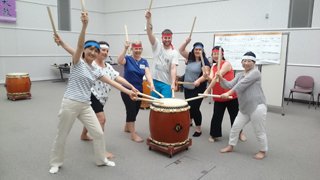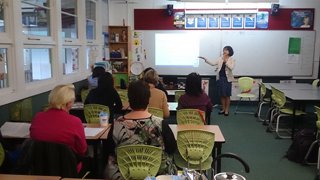What Does a National Advisor Do?
New Zealand Ministry of Education
MIKAMI Kyoko
Japanese-Language Specialists (hereinafter “Specialists”) dispatched to New Zealand work as National Advisors at an organization called International Languages Exchanges and Pathways (ILEP), which the New Zealand Ministry of Education commissions to promote foreign language education. Except when Specialists are visiting other schools or hosting workshops, they work at the offices of ILEP, located within the University of Auckland, attending meetings or handling email. In addition to the Japanese advisor, there are also National Advisors for Chinese, Spanish, French, and German working at ILEP, as well as a Korean mentor (instructor) and advisors in charge of teacher training. These members work together as a team to promote education for each language and support teachers.
The duties of Advisors vary widely, but the main duties are visiting schools and hosting workshops. Another duty is to design and advertise training for teachers to improve their Japanese and Japanese teaching skills, and to participate in that training with the teachers.
Kansai Immersion Training

Photo (1): Participating in the Kansai Immersion Training
Photo (1) above shows six teachers of Japanese from New Zealand participating in a Wadaiko Japanese drum session during the immersion training held at the Japan Foundation Japanese-Language Institute, Kansai (hereinafter “Institute”) in October 2017. True to the name Immersion, the teachers participating in the training were completely immersed in the Japanese language for the two-week course. In addition to lectures at the Institute on Japanese-language teaching methods by lecturers, the course also involved tours of Japanese language classes for diplomats and cultural experiences such as Wadaiko drum playing and Ikebana flower arranging. The participants also visited nearby primary and secondary schools to interact with the students. All together, these activities comprised a very busy and enriching program. During the program’s orientation in Osaka, the participants also engaged in such activities as taking pictures in shops and in town, collecting Japanese style gifts for use as teaching materials, and recording video as they interviewed Japanese people. All of these materials and experiences will be put to use in their Japanese classes when they return to New Zealand.
All of the participating teachers were overjoyed to have a truly wonderful experience. Furthermore, despite each of the six participants having different levels of experience and Japanese language ability, seeing them cooperate with each other to achieve their assigned tasks and learn together was a very valuable experience for me as their accompanying Specialist.
Japanese Language Workshops

Photo (2): A Japanese language workshop
Photo (2) shows a Japanese language workshop held in New Zealand’s capital of Wellington. This workshop, entitled “Let’s talk about Japanese language itself!” was hosted for the purpose of learning about the basics of Japanese grammatical structure and how to study verbs. The workshop included a visiting linguist from the University of Otago in Dunedin on the South Island, whereas the Specialists were in charge of a quiz on Japanese grammar. The same workshop was held in both Auckland and Dunedin the previous year, and this time, eight teachers of Japanese at secondary schools in the capital of Wellington participated. Questions and opinions were exchanged between the teachers, both native Japanese speakers and fluent veteran New Zealander teachers, for a vigorous and active atmosphere that resulted in a very fruitful workshop.
In Support of Japanese Language Teachers
A phenomenon occurred in New Zealand in the 1990s, called the Tsunami, in which there was a sudden rise in the number of Japanese learners. But later, as the Japanese economy began to stagnate, the number of learners declined quickly as well. Despite those overall trends, we heard reports from the schools where teachers still strived to offer appealing and effective classes on a daily basis that the number of students had increased over the previous years.
Japanese teachers in New Zealand are very busy, with a variety of work to do both inside and outside of the school in addition to the classroom. Many of the teachers are not native Japanese speakers, and surely many of those wish to improve their Japanese language skills further. There are also rural areas outside the major cities, such as Auckland, where there are almost no Japanese residents and only one Japanese language teacher. I hope to continue to visit as many schools as possible, observe as many classes as possible, and listen to what they have to say in order to support those teachers. I also hope to continue providing those teachers with knowledge on Japanese-language education, class ideas, and new teaching materials, and other helpful information via the workshops.
- What We Do Top
- Arts and Cultural Exchange [Culture]
- Japanese-Language Education Overseas [Language]
- Japanese-Language Education Overseas [Language] Top
- Learn Japanese-language
- Teach Japanese-language
- Take Japanese-Language Test
- Know about Japanese-language education abroad
- The Japanese-Language Institute, Urawa
- The Japanese-Language Institute, Kansai
- Japanese-Language Programs for Foreign Specified Skilled Worker Candidates
- Japanese Language Education for Japanese Children Resident Overseas and for the Descendants of Migrants
- Archives
- Japanese Studies and Global Partnerships [Dialogue]
- JF digital collection
- Other Programs / Programs to Commemorate Exchange Year
- Awards and Prizes
- Publications
